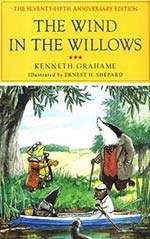
![]() Thomcat
Thomcat
2/27/2022
![]()
A series of short stories, each in a different style, resulting in a story suitable for children and adults alike. The illustrations in various editions vary wildly, and make up a good part of the story.
The story itself, 4 stars. I read two different annotated editions from two different libraries simultaneously, and was very surprised by just how different they were.
Let's start with Seth Lerer, published in 2009. This is an excellent annotation, 5 star, adding in every way to the story. The editor notes the differing styles in the stories, with comparisons and quotations from relevant passages. Three Men in a Boat, Sherlock Holmes, Romantic period poetry, Shakespeare's Falstaff, Sigurd, early films with locomotives, the Bible, and of course, Ulysses. Time periods of these and other unusual words are given - this book really places the tale within the time frame of the original readers. An epilogue delves into the subject I touched on earlier - the differing styles of illustrations - and a color insert mid-book has excellent examples of these. Highly recommended!
Interestingly, I found that I couldn't "read" two different versions of the book on Goodreads. I'll go back and add this second part to the second annotation next - can I give it a different rating also?
That second annotation is the larger volume, edited by Annie Gauger, published by Norton in 2009 to "honor the author's 150th birthday." This one starts off with a biography, and unfortunately this is one of only two things that are good in an otherwise poor work. The other is the additional illustrations, color throughout.
The biography is good and bad. It was interesting to consider the connection between main character Mole and Grahame's son, suffering from macular degeneration. These stories originated as bedtime tales, and it is often reported that Grahame identifies with Water Rat. Other aspects of the biography were unimportant to this story and probably belong in a full biographical work of this famous Scottish writer.
A word about annotations - they should explain aspects of the story but not get in the way of the story. Some of the best I've seen are in wide margins, with the story in the middle (Lerer does this), or on alternating pages with the story.
In Gauger's book, the annotations run rampant, and commit the cardinal sin of completely interrupting the story. In this volume, a half-page of story can be followed by a full page of annotations, another half page with an illustration, and finally get back to the story (often interrupted mid sentence!) on the third page following. Partly this is due to the volume of them, the rest is honestly poor choice of what to annotate. I found very little cross-over with the Lerer volume (maybe 15%?). On the goodreads scale, this annotation rates not much over 1 star.